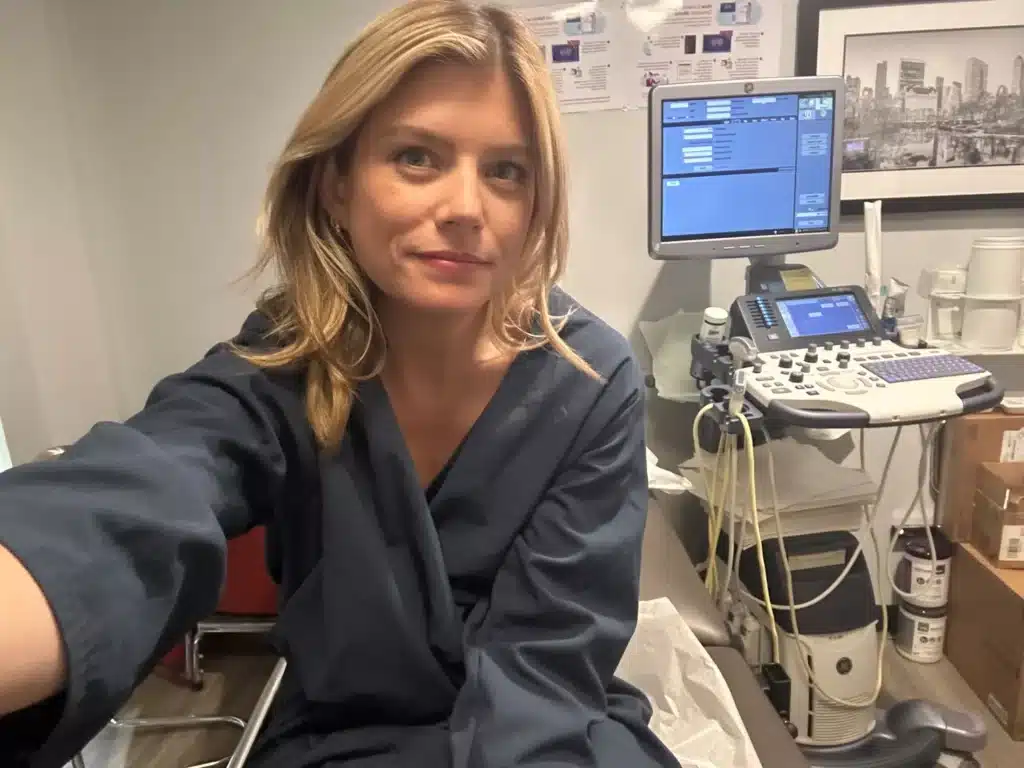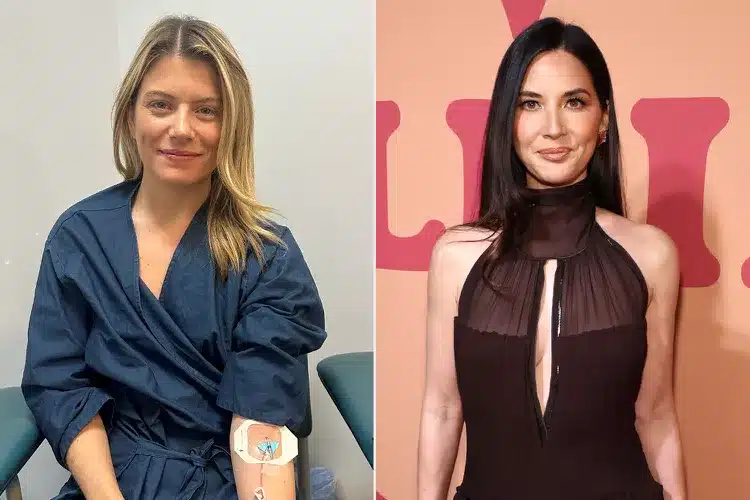For Alison Hall, journalism has always been about telling other people’s stories. Her job often involves shedding light on extraordinary events or inspiring journeys. But in 2024, one assignment turned her world upside down in a way she never anticipated. It all began with a story about actress Olivia Munn.
An Assignment That Hit Close to Home

In March 2024, Olivia Munn publicly revealed her breast cancer diagnosis and shared how a life-saving tool the Breast Cancer Risk Assessment Tool (BCRAT) enabled her to catch the disease early. Known as the Gail Model, this test estimates a woman’s likelihood of developing breast cancer based on personal and family history. Munn credited the test with saving her life and encouraged others to consider using it.
Alison was assigned to cover Munn’s story, a topic that immediately resonated with her. Her own mother had battled breast cancer at 50, and though Alison had tested negative for the BRCA gene mutation in her 20s, she had never given much thought to her personal risk. That changed after hearing Munn’s story.
“I thought, why not? It’s just a test,” Alison recalled. She decided to try the BCRAT herself—not only for the segment but also to understand more about her own health.
The Test That Changed Everything
Alison filmed her visit to the doctor for Inside Edition, documenting her experience taking the risk assessment. When her results came back, they revealed a lifetime breast cancer risk of 36%. For context, women with a lifetime risk of 20% or higher are considered high-risk and are advised to begin annual screenings, including mammograms and MRIs, by age 30.
Hearing her results was a shock. “Wow, that feels high,” Alison remembered thinking. Beneath her calm exterior, emotions swirled concern, fear, and a nagging question: What now?
Encouraged by her doctor, Alison began a rigorous screening schedule that included her first-ever breast MRI. It turned out to be a life-changing decision.
An Unexpected Diagnosis

In October 2024, just months after starting regular screenings, Alison received startling news: her MRI showed abnormalities. A biopsy confirmed it was ductal carcinoma in situ (DCIS)—stage 0 breast cancer. DCIS is an early form of cancer where abnormal cells are confined to the milk ducts and haven’t spread. It’s considered highly treatable if caught early.
Alison was stunned. “Disbelief, shock, and then gratitude,” she said, describing her reaction. “If I hadn’t done this story on Olivia Munn, I wouldn’t have caught this cancer so early. It could have been years before it was detected.”
Taking Back Control
With her diagnosis in hand, Alison began exploring treatment options. After extensive research and consultations with her doctors, she decided on a double mastectomy, a procedure that would remove the current cancer and dramatically reduce her risk of future diagnoses.
“For me, this was about taking back control,” Alison said. “Cancer can make you feel powerless, but this decision gave me some of that power back. It also gave my family peace of mind.”
Her surgery was scheduled for January 13, 2025.
A Message from Olivia
In the days leading up to her surgery, Alison received a heartfelt message from Olivia Munn, who had heard about her diagnosis.
“You are now on the path to survival,” Munn wrote. “By telling your story, you are creating a ripple effect of hope and saving lives.”
Alison was deeply moved. “Hearing from Olivia felt like coming full circle,” she said. “Her bravery inspired me, and now she’s encouraging me to share my story so I can help others, too.”
The Power of Storytelling
Alison believes her experience highlights the transformative power of storytelling. Just as Olivia’s story had prompted Alison to take action, Alison hopes her journey will inspire others to do the same.
“Had I not reported on Olivia’s journey, I wouldn’t have known about this tool or the importance of early screenings,” Alison said. “If sharing my experience encourages even one person to get checked, then it’s all worth it.”
The Breast Cancer Risk Assessment Tool (BCRAT) is a simple, five-minute test that evaluates a woman’s likelihood of developing invasive breast cancer. By analyzing factors like family history, age, and race, the test helps doctors identify high-risk individuals who can benefit from early and regular screenings.
Alison’s story is a powerful reminder that early detection saves lives. For women with a family history of breast cancer or other risk factors, taking the test could be a crucial first step toward prevention.
As Alison prepares for her surgery, she’s optimistic about the future and grateful for the overwhelming support from family, friends, and viewers. Her husband, whom she calls her “rock,” has been by her side every step of the way.
“Cancer is scary, but it doesn’t have to define you,” Alison said. “I’m choosing hope, and I hope others will, too.”
Through her courage and openness, Alison Hall has not only reclaimed her own health but also inspired countless others to take proactive steps in their journeys. Her story is proof that sometimes, the stories we tell don’t just inform, they save lives.
References
CBS Mornings – Alison Hall’s Journey
https://www.cbsnews.com
National Cancer Institute – Breast Cancer Risk Assessment Tool
https://bcrisktool.cancer.gov
American Cancer Society – Breast Cancer Facts & Figures
https://www.cancer.org
Olivia Munn’s Breast Cancer Diagnosis Coverage
People Magazine Article on Olivia Munn
https://people.com
Inside Edition – Alison Hall’s Story
Inside Edition Coverage of Alison Hall’s Diagnosis
https://www.insideedition.com
Ductal Carcinoma in Situ (DCIS) Information
Breastcancer.org Overview of DCIS
https://www.breastcancer.org/symptoms/types/dcis


